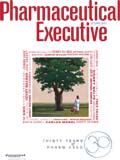Andrew Witty: The Legacy of High Expectations
Andrew Witty, Chairman & CEO, GlaxoSmithKline
Few industries can transform society. The pharmaceutical industry is one.

Andrew Witty
Better health, along with other critical factors, such as education and stable governments, leads to a more productive society with greater economic prosperity.
Through discovery and development of medicines and vaccines, our industry has helped save lives and improve the health of millions people around the world. The impact of many debilitating diseases has been reduced and life expectancy has dramatically increased. Yet, there is much more to be done, with many illnesses and conditions still inadequately treated.
If we are to continue to make transformational contributions, our industry must apply our ability to innovate to our own business model. The pressure of market forces demands this. The patent cliffs of the past decade will impact the sales of research-based companies by hundreds of billions of dollars. Purchasing power in the private and public markets has consolidated, putting downward pressure on prices. Declining research and development productivity has undercut our ability to bring transformative medicines and vaccines to patients and offset pricing and patent expiry market pressures.
Fundamental to addressing these challenges is reinvigorating research and development. We must more effectively harness intellectual diversity and unleash creativity to improve drug discovery and we must better manage drug development to be more efficient and improve our success rates for regulatory approval. At GSK, we have made significant changes to how we discover, develop, invest, and measure returns on investment in R&D.
If we improve our research productivity and adapt to the market forces shaping healthcare systems around the world, we will see an industry in the future that looks very different from today.
Our responsibilities to society, though, will not change. In the developed world, that will require us to better demonstrate our value to those we serve and be more constructive partners in working toward solutions. In the developing world it will mean looking at new ways to solve problems and improve health.
For many years in the West, the proportion of the total healthcare bill absorbed by pharmaceuticals has remained very small. Yet, the potential for avoiding costs elsewhere—in intensive care, in hospital stays, and in surgery—through prevention and effective, timely treatment is extraordinary. Pharmaceuticals and vaccines do that. Our responsibility is to ensure that we bring to market medicines that are demonstrably better than current standards of treatment. By doing so, we will significantly advance healthcare and truly provide value to society.
We also must be legitimate partners in working to improve public health in the developing world. We must act creatively and intelligently to find solutions to health problems where there are no Western-like marketplace incentives. For example, at GSK we are developing a vaccine against malaria, through a public/private partnership which spans three continents and involves top African research centers, the PATH Malaria Vaccine Initiative, and the Bill & Melinda Gates Foundation.
This type of approach requires a logical cascade of changes to our business—from greater flexibility on intellectual property, to providing the capacity and the resources to actually do research, to collaborating within and outside our sector, to helping improve healthcare infrastructure.
It's my belief that our industry will continue to make a significant contribution to society if we continue to improve the way we go about our work. I also believe we can receive a fair return for our efforts and balance the pressures of those we serve, not only by meeting the demands of our traditional stakeholders in the West, but also by seizing the opportunity we have to make a true difference in the lives of millions of people in all parts of the world.

Addressing Disparities in Psoriasis Trials: Takeda's Strategies for Inclusivity in Clinical Research
April 14th 2025LaShell Robinson, Head of Global Feasibility and Trial Equity at Takeda, speaks about the company's strategies to engage patients in underrepresented populations in its phase III psoriasis trials.
Beyond the Prescription: Pharma's Role in Digital Health Conversations
April 1st 2025Join us for an insightful conversation with Jennifer Harakal, Head of Regulatory Affairs at Canopy Life Sciences, as we unpack the evolving intersection of social media and healthcare decisions. Discover how pharmaceutical companies can navigate regulatory challenges while meaningfully engaging with consumers in digital spaces. Jennifer shares expert strategies for responsible marketing, working with influencers, and creating educational content that bridges the gap between patients and healthcare providers. A must-listen for pharma marketers looking to build trust and compliance in today's social media landscape.
Pfizer, GSK Gain ACIP Recommendations for RSV and Meningococcal Vaccines
April 18th 2025The Centers for Disease Control and Prevention’s Advisory Committee on Immunization Practices voted to expand access to Pfizer’s respiratory syncytial virus vaccine Abrysvo for high-risk adults in their 50s and voted in favor of GSK’s meningococcal vaccine, Penmenvy, for streamlined adolescent protection.